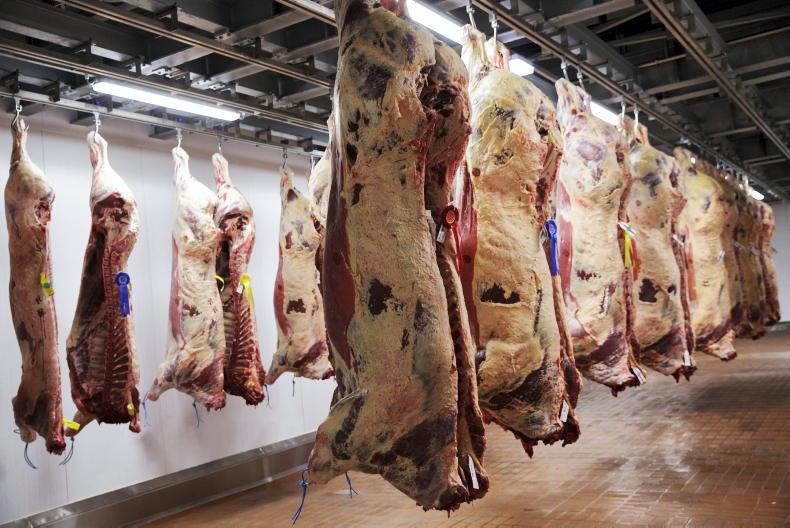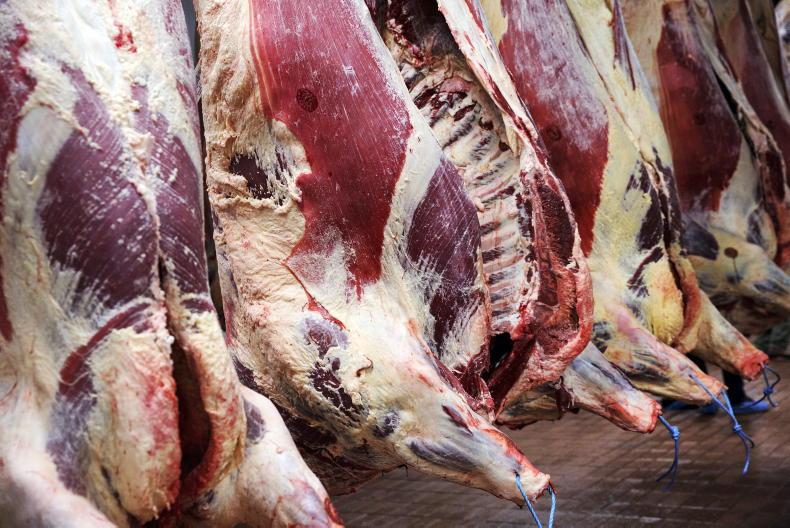Beef
Half of Ireland’s beef exports go to the UK. A prolonged drop in sterling would put downward pressure on returns to beef processors over coming months and they will pass that back to farmers. This week, procurement officers were taking a day-by-day approach to the trade.
However, Meat Industry Ireland is confident that exports of Irish beef and other meats will continue at high volumes. “We believe that the sheer scale and importance of the meat trade flows between Ireland and the UK, coupled with traditional trading links and the strong business-to-business relationships, will ensure that trade continues, even if at reduced volumes and price,” it said in a statement.
But all acknowledge that if the UK leaves the EU single market it could look to import beef from South America. Argentina and Brazil may try to use to use the UK as a back door for exporting beef into Europe, having failed to gain entry via a Mercosur deal.
“We shouldn’t automatically assume that these deals will take many years to arrange and they could pose significant structural challenges for beef exporters to the UK in the medium term,” ABP chief executive Paul Finnerty said this week.
Brexit is the biggest threat to the Irish beef industry in our lifetime, Tony O’Neill, deputy chief executive of Dunbia, said. The company operates in both Ireland and the UK. “We are concerned about the sudden weakening of the value of sterling and the long-term concern is what trade deals the UK will enter with Mercosur and the US that allow tariff-reduced beef into the UK market in return for the UK selling them financial services and industrial goods.”
It’s unclear what the effect on live cattle exports to the UK will be. “The effects that it will have won’t really be seen until it comes to weanling sales later in the year,” said Helen Kells, manager of Carrigallen mart. “It won’t help prices as you would have to believe that there will be fewer Northern buyers around the ring.”
But many of the mart managers the Irish Farmers Journal talked to reported that there has been fewer Northern Ireland buyers around the ring over the last 12 months anyway, due to labelling issues.
Full coverage: Brexit
Beef
Half of Ireland’s beef exports go to the UK. A prolonged drop in sterling would put downward pressure on returns to beef processors over coming months and they will pass that back to farmers. This week, procurement officers were taking a day-by-day approach to the trade.
However, Meat Industry Ireland is confident that exports of Irish beef and other meats will continue at high volumes. “We believe that the sheer scale and importance of the meat trade flows between Ireland and the UK, coupled with traditional trading links and the strong business-to-business relationships, will ensure that trade continues, even if at reduced volumes and price,” it said in a statement.
But all acknowledge that if the UK leaves the EU single market it could look to import beef from South America. Argentina and Brazil may try to use to use the UK as a back door for exporting beef into Europe, having failed to gain entry via a Mercosur deal.
“We shouldn’t automatically assume that these deals will take many years to arrange and they could pose significant structural challenges for beef exporters to the UK in the medium term,” ABP chief executive Paul Finnerty said this week.
Brexit is the biggest threat to the Irish beef industry in our lifetime, Tony O’Neill, deputy chief executive of Dunbia, said. The company operates in both Ireland and the UK. “We are concerned about the sudden weakening of the value of sterling and the long-term concern is what trade deals the UK will enter with Mercosur and the US that allow tariff-reduced beef into the UK market in return for the UK selling them financial services and industrial goods.”
It’s unclear what the effect on live cattle exports to the UK will be. “The effects that it will have won’t really be seen until it comes to weanling sales later in the year,” said Helen Kells, manager of Carrigallen mart. “It won’t help prices as you would have to believe that there will be fewer Northern buyers around the ring.”
But many of the mart managers the Irish Farmers Journal talked to reported that there has been fewer Northern Ireland buyers around the ring over the last 12 months anyway, due to labelling issues.
Full coverage: Brexit









SHARING OPTIONS